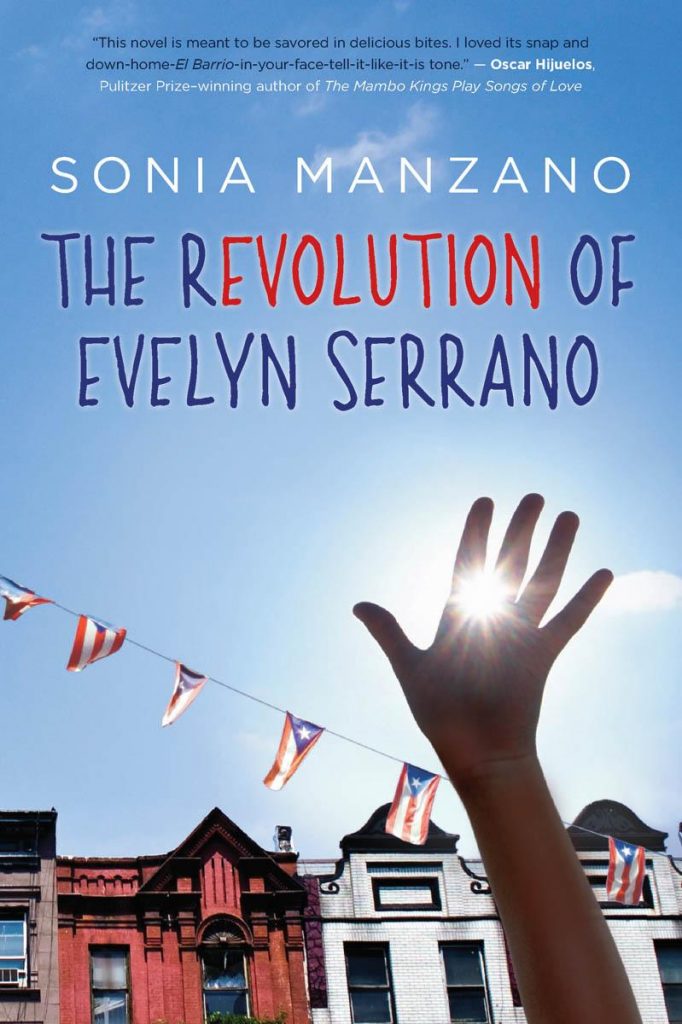by Josh Hill and Julia López-Robertson, University of South Carolina
The Revolution of Evelyn Serrano by Sonia Manzano is about a young Puerto Rican girl, Evelyn, coming of age in the Spanish Harlem neighborhood of New York City during the summer of 1969. Evelyn’s Abuela left Puerto Rico and moved in to the family’s tiny apartment adding to the already tumultuous time in their home and neighborhood. Not only is there one more body in their tiny apartment, she has taken over Evelyn’s bedroom. Their relationship changes however, when the Young Lords, a group of Puerto Rican activists, begin to agitate for change in the neighborhood. The Young Lords presence in the neighborhood causes Evelyn to become intrigued with her Puerto Rican heritage and family history leading her to see Abuela as a source of knowledge and connection to her past.

This text helped us think about the ways in which family, both the family of our birth and the family we create/is created for us, help us to challenge inequitable situations. Yosso (2005) introduces the concept of community cultural wealth (CCW); the idea that People of Color possess their own knowledge and set of skills that help them navigate throughout and within society. CCW refutes a deficit view in education and instead views Communities of Color as holders of knowledge. Yosso has identified six forms of CCW: familial, navigational, linguistic, aspirational, resistant, and social capital. For the purposes of this blog post, the focus will be on familial capital and resistant capital.
Familial capital is the idea that family is not only defined by your blood relation, but also those individuals who you bring into your family to create a stronger kinship network. Familial capital is a way for a community to pass down knowledge and cultural history to the next generation (Yosso, 2005). We see familial capital in relation to the work done by the Young Lords at a community church and specifically the community breakfasts. The Young Lords community breakfast program is about more than simply providing food; it is about developing a sense of kinship by breaking bread and sitting at a family table. The breakfasts are also about education–an effort led by Evelyn’s abuela. Abuela teaches the children and community members the history of Puerto Rico in an effort to extend the idea of kinship.
This idea of education leads into resistant capital: teaching young people the ways in which Communities of Color have resisted and continue to resist oppressive structures such as racism, patriarchy, and classism. Abuela teaches the children about her own fight against inequities in Puerto Rico during the Ponce Massacre. The Ponce Massacre, took place on March 21, 1937; “19 people were killed and more than 100 wounded when police opened fire on a demonstration calling for independence from the United States” (“Remembering Puerto Rico’s Ponce Massacre,” n.d.). Abuela tells the children about her own participation in this protest and watching a friend die. Through her stories, Abuela is connecting the past and present; she wants the children (and community) to understand that Puerto Rican people have a history of demanding equity from the United States government.
As Evelyn learns about her culture and gains more cultural knowledge and pride, so can the readers of this book. At the beginning of the story, Evelyn does not want to be known as Rosa, her actual first name. She says there are too many Rosas in her neighborhood and wants everyone to call her Evelyn, her middle name. Evelyn thinks this name is more unique and allows her not to be like everyone else in the neighborhood. But by the end of the story, Evelyn’s cultural pride has grown; she realizes that her neighborhood and her community are valuable and she now accepts being named Rosa.
The Revolution of Evelyn Serrano can help readers examine their own community pride, and cultural and familial heritage. In the previous post, we read the story of Valerie Muñoz’s experience visiting her grandparents and extended family, an example of familial capital. Valerie spends much of the story sad to be at the family ranch. She is cold and tired and she is nervous about all of the people, but by the end, the family has come together over a pot of dulce de leche.
Valerie’s mother is showing her children the house where she grew up. Valerie and her brothers are meeting their abuelo and abuela, tíos and tías. They are learning about their family’s history and learning how dulce de leche is made. They also learn and ties this family together through their sweet tooth. Just like Evelyn learns her family history from her abuela, Valeria learns her family history from her abuela and abuelo.
References
Manzano, S. (2012). The revolution of Evelyn Serrano. Scholastic.
Remembering Puerto Rico’s Ponce Massacre. (n.d.). Retrieved May 4, 2017, from http://www.democracynow.org/2007/3/22/remembering_puerto_ricos_ponce_massacre
Yosso, T. J. (2005). Whose culture has capital? A critical race theory discussion of community cultural wealth. Race Ethnicity and Education, 8(1), 69–91. https://doi.org/10.1080/1361332052000341006
Journey through Worlds of Words during our open reading hours: Monday through Friday 9 a.m. to 5 p.m., Saturday 9 a.m. to 1 p.m. Check out our two online journals, WOW Review and WOW Stories, and keep up with WOW’s news and events.
- Themes: Josh Hill, Julia López-Robertson, Revolution of Evelyn Serrano, Sonia Manzano, Valerie Muñoz
- Descriptors: Books & Resources, WOW Currents
